Click on images to enlarge

habit (Photo: Forest and Kim Starr, USGS)
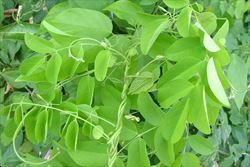
climbing stems and young leaves (Photo: Sheldon Navie)
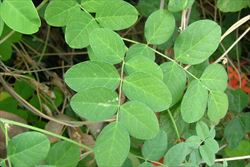
once-compound leaves (Photo: Sheldon Navie)
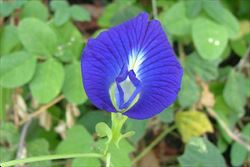
close-up of blue flower (Photo: Sheldon Navie)

white-flowered form (Photo: Chris Gardiner)

immature fruit (Photo: Sheldon Navie)
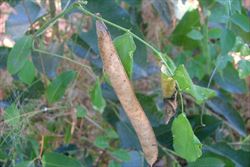
mature fruit (Photo: Sheldon Navie)
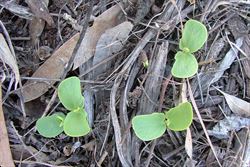
seedlings (Photo: Sheldon Navie)
Scientific Name
Clitoria ternatea L.
Synonyms
Ternatea vulgaris Kunth
Family
Fabaceae (Queensland, the ACT, Victoria, Tasmania and the Northern Territory)Fabaceae: sub-family Faboideae (New South Wales)Leguminosae (South Australia)Papilionaceae (Western Australia)
Common Names
Asian pigeon wings, Asian pigeon-wings, Asian pigeonwings, blue pea, blue pea vine, butterfly pea, cordofan pea, Darwin pea, kordofan pea, pigeon wings
Origin
Native to Africa (i.e. Angola, Benin, Burundi, Cameroon, Chad, Djibouti, Ethiopia, Gabon, Ghana, Guinea, Guinea Bissau, Ivory Coast, Kenya, Malawi, Mali, Mozambique, Nigeria, Senegal, Sierra Leone, Somalia, South Africa, Sudan, Tanzania, the Gambia, Togo, Uganda, Zaire, Zambia and Zimbabwe) and Mauritius.
Naturalised Distribution
Naturalised in many parts of northern Australia. It is common in northern and central Queensland and in the northern parts of Western Australia and the Northern Territory. It is less common in south-eastern Queensland and the north-western parts of Western Australia, and is also naturalised on Christmas Island.
Also widely naturalised throughout the humid and sub-humid lowlands of Asia, on several Pacific islands, in the Caribbean, Central America and South America, and in the southern parts of USA (i.e. Florida, Georgia, Texas and California).
Notes
This pasture legume (and occasional garden ornamental) has escaped cultivation and invades river banks, creek lines, the margins of waterholes, irrigation channels, disturbed sites, waste areas, roadsides and disturbed natural vegetation (i.e. open woodlands and grasslands).
Butterfly pea (Clitoria ternatea) is regarded as an environmental weed in Western Australia and the Northern Territory, and is also seen as a potential environmental weed in northern Queensland. It is actively managed by community groups in the Northern Territory, and is of most concern where it has invaded riparian zones within conservation areas near Darwin. It has also been listed as a priority environmental weed in one Natural Resource Management region in northern Australia.

